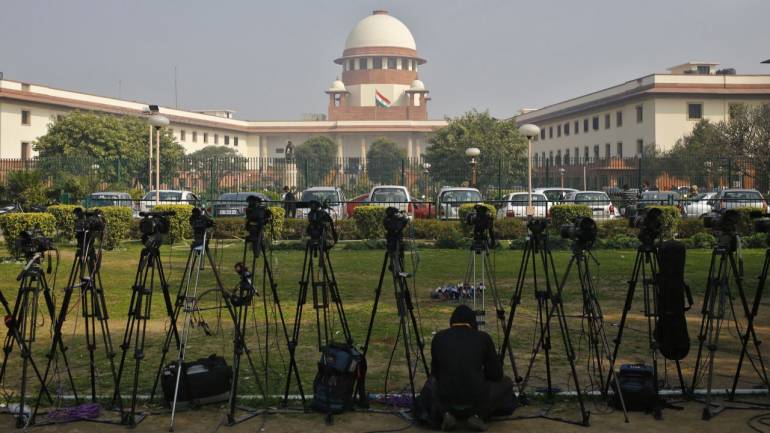By Jhalak Nandwani, Gujarat National Law University, Gandhinagar.
We all have watched the live streaming of sessions of the Parliament on Lok Sabha and Rajya Sabha TV since the past 10 years. It has brought awareness amongst the common people about the functioning of Parliament, all State Assemblies and of our elected representatives as well. But have you ever thought about getting to see live streaming of Supreme Court proceedings?
The Supreme Court deals with a number of cases of public importance like environmental issues, drunken driving cases, ban on firecrackers, triple talaq, ban of alcohol in some States of our country, homosexuality, rights of Parsi women, etc., which affect people at large in some or the other way. These judgements are binding on every citizen of the country; such citizens thus have the right to know what arguments are made in the Court and the responses and decisions of the Judges in such cases. Also, it is not possible for everyone to be physically present in the Supreme Court to hear the arguments and the decisions on such issues. Technology has already helped our country progress and has helped to in bridging the gap between people and their requirements. So why can’t we use technology to fill this gap as well?
Three years ago, advocate Mathew J. Nedumpara filed two writ petitions seeking live telecast of Court proceedings in cases of national importance, for e.g.,cases discussing the validity of Aadhaar, right to sexual orientation, etc. But his petition was rejected by the Supreme Court. Following in his footsteps, a senior lawyer, Indira Jaising filed a writ petition under Article 32 of the Constitution, in the Supreme Court, seeking for live streaming and/or video recording of Supreme Court cases of national importance, that impact the public at large, in accordance with the Right to Receive Information, under Article 19(1)(a) of the Constitution. Referring to the cardinal principle of law that justice should not only be done, but also seen to be done, Ms Jaising stated that the best possible manner to achieve this goal is to live stream the proceedings in important cases, so that arguments of all counsels and the interaction between the judges and the lawyers in the course of the hearing is recorded accurately and is without any distortions. She suggested that the Court could start recording the proceedings and uploading the videos on YouTube. This would avoid incorrect or incomplete information about the case, from reaching the citizens. Also, many decisions of national importance affect citizens, directly or indirectly, in varied ways. Live Streaming could help them to be a part of, and to possess a clear and complete idea of such proceedings.
But wouldn’t live streaming prove to be a disadvantage when it comes to privacy? There are many cases involving personal matters and streaming those cases for the public would affect the privacy of the concerned parties. To overcome this disadvantage, Ms Indira Jaising, in her petition, put forward, that the Judiciary could retain the right of deciding which cases are to be streamed. Also, the Court may place restrictions on telecast of cases involving countervailing interests of privacy, such as Family Law, and Criminal Law Cases, etc. It has also been stated in the petition that it is upon the Court to decide the ambit of the term “of public importance”.
Live telecasting of Supreme Court proceedings in cases of national importance will help improve access to Courts, and will remove the drawbacks of second hand information, some of which are, getting incomplete information, misinformation or opinion-based information. Rather than relying on some third party’s information, people could directly access information pertaining to the case they are interested in. Live streaming can also be a good source of education, especially for law students and those aspiring for Civil Services.
Majority of the people in our Country think that the Court Proceedings and the Judgements delivered are sometimes biased and support the interests of those in power, rather than the common public. If we adopt the method of live streaming of such cases, it could help the citizens to retain confidence in the Judiciary and would help bring about transparency in the entire process. It further helps in empowering the masses and can act as a tool to protect their rights as well.
As per the Common Law principle of Open Justice, various Common Law jurisdictions have facilities for recording and streaming of their proceedings. Most of the aforementioned countries, including Canada, Britain, Australia and South Africa, permit the recording of their court proceedings up to varying degrees. International judicial bodies such as the European Court of Human Rights, the International Court of Justice and the International Criminal Court, also allow web telecast of their proceedings.
The law and judicial processes are alien to most citizens, who have no legal training or possess no legal knowledge. Yet the judgements passed by our Courts play a huge role in all our lives. I, therefore, strongly believe that all citizens must be given an opportunity to see the court proceedings and understand how the law functions. It would create a sense of responsibility upon the judges as they will be watched by millions of common people. It will inspire people’s confidence in the judiciary and will promote them to be a part of it. It would help them to have a basic understanding of the essence behind the laws that bind them. The next generation of lawyers and citizens will also gain from the immense educational and archival value of the landmark cases. So, won’t it be intriguing and exciting to see how the lawyers represent the people of this country and how the judiciary of our country works? As an enlightened citizen of this country, I strongly support the live telecasting of Supreme Court decisions as it would bring a lot of clarity and transparency in our judicial system. Would you support the same?

